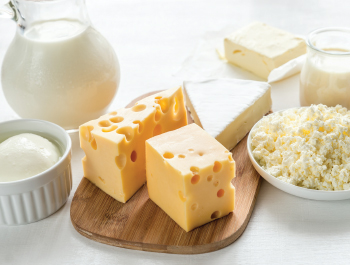Get cultured about dairy
This article was originally published in November 2015

Take heart, cheese lovers! There are plenty of reasons to choose fermented dairy (even cheese!) for good health — see PCC nutrition educator Nick Rose’s article, “Quel fromage!” for the latest research. But that’s beside the point. Cheese, yogurt and other cultured dairy foods are a luxurious pleasure to eat. Creaminess offset with a subtle tang is the trademark flavor of cultured dairy and is why we love using it in so many recipes. Here we extoll the virtues of a selection of cultured dairy you’ll find at PCC, from farmstead cultured butter to the best buttermilk you’ll ever taste.
Maple Hill Creamery yogurt
Certified organic, 100-percent grass-fed, whole-milk yogurt from family farms in upstate New York. Maple Hill is the first creamery to receive PCO 100-percent grass-fed certification, considered the gold standard. Milk from grass-fed cows is higher in heart-healthy omega-3 fats and conjugated linoleic acid (CLA). We love the creaminess and also that the flavored yogurts contain much less sugar than other brands.
Jacobs Creamery cultured butter
Jacobs Creamery in Chehalis, Washington starts with fresh cream from pastured cows and adds its own unique culture blend, enhancing the natural flavors of the cream. The result is a butter that’s silky smooth with a rich, nutty flavor. Each batch is hand-churned. Spread this on crusty bread, such as The Essential Baking Company’s Pain du George. Also not to miss: Jacobs Creamery gouda. You’ll only find Jacobs Creamery cheese and butter at PCC.
Grace Harbor buttermilk
PCC shoppers have long loved Grace Harbor’s cream-top, non-homogenized, whole-milk yogurt from a herd of Guernsey cows raised in Northwest Washington. Now, Grace Harbor’s Tim and Grace Lukens are churning out a creamy buttermilk that’s second-to-none. Other brands may taste bitter, but Grace Harbor’s buttermilk is smooth and mild, with a pleasant tang. Use it in a range of recipes, from Good Ol’ Southern Fried Chicken to a decadent Buttermilk Orange Cake with Chocolate Ganache (find the recipes).
Redwood Hills Farm goat kefir
Kefir is similar to yogurt but consumed in a drinkable form instead of with a spoon. It’s fermented for a longer time than yogurt and with a greater variety of bacterial species, so it has more gut-healthy probiotics. We love Redwood Hills Farm’s goat kefir — especially the Blueberry Pomegranate Açaí flavor — because it has no added sugar or preservatives. If you prefer a milder flavor, try Wallaby’s organic kefir, made with cow’s milk.
Ancient Heritage Dairy Isabella cheese
Isabella is a washed rind cheese aged at least 60 days and named for the young granddaughter of one of the dairy’s owners. It’s made with raw cow and sheep’s milk, with a taste that has been compared with Belgian ales because of its sweet, briny flavors and yeast notes. A light, bloomy rind reveals a thick and creamy interior.
Le Gruyère AOP cheese
Le Gruyère AOP cheese has been produced in the region of Gruyère, Western Switzerland, since the 12th century. It’s a full-bodied cheese made from raw milk from cows fed grass (summer) and hay (winter). The character of the cheese lies in its specific production methods, which remain true to the original recipe and follow time-honored techniques, including aging for at least 11 months in sandstone caves. Famously used in fondue, this cheese melts beautifully and is a sharp addition to grilled cheese sandwiches, gratins, sauces or just for snacking. Pair it with a chardonnay.
Willapa Hills cream cheese
On the banks of the Chehalis River in Doty, Washington, Stephen Hueffed and Amy Turnbull are making a cultured cream cheese with no fillers and no stabilizers; just milk, cream, cultures and salt. Vat culturing and bag draining produces an unparalleled creamy texture and sweet flavor. If you’re a transplanted New Yorker, you’ll want to spread this on the best bagel you can find.
Bio-K+ fermented dairy probiotic
If you want even more probiotics to boost your intestinal health than yogurt or kefir offer, this tangy dairy-based supplement will do the trick. Each small bottle contains 50 billion probiotic bacteria, and you can drink as little as 1/4 a bottle a day and still benefit.
Is dairy not your style?
See “Get cultured” for other cultured foods at PCC, such as miso and fermented vegetables.
